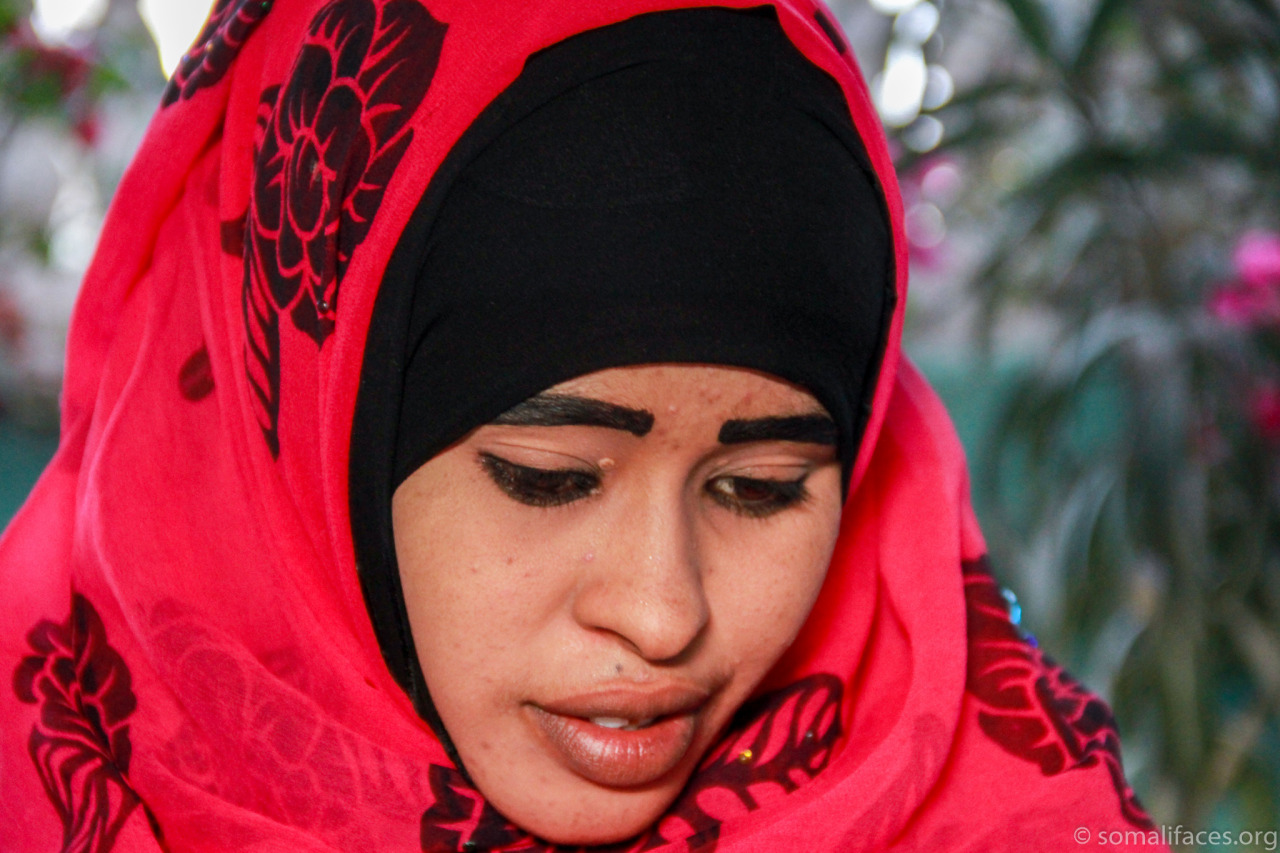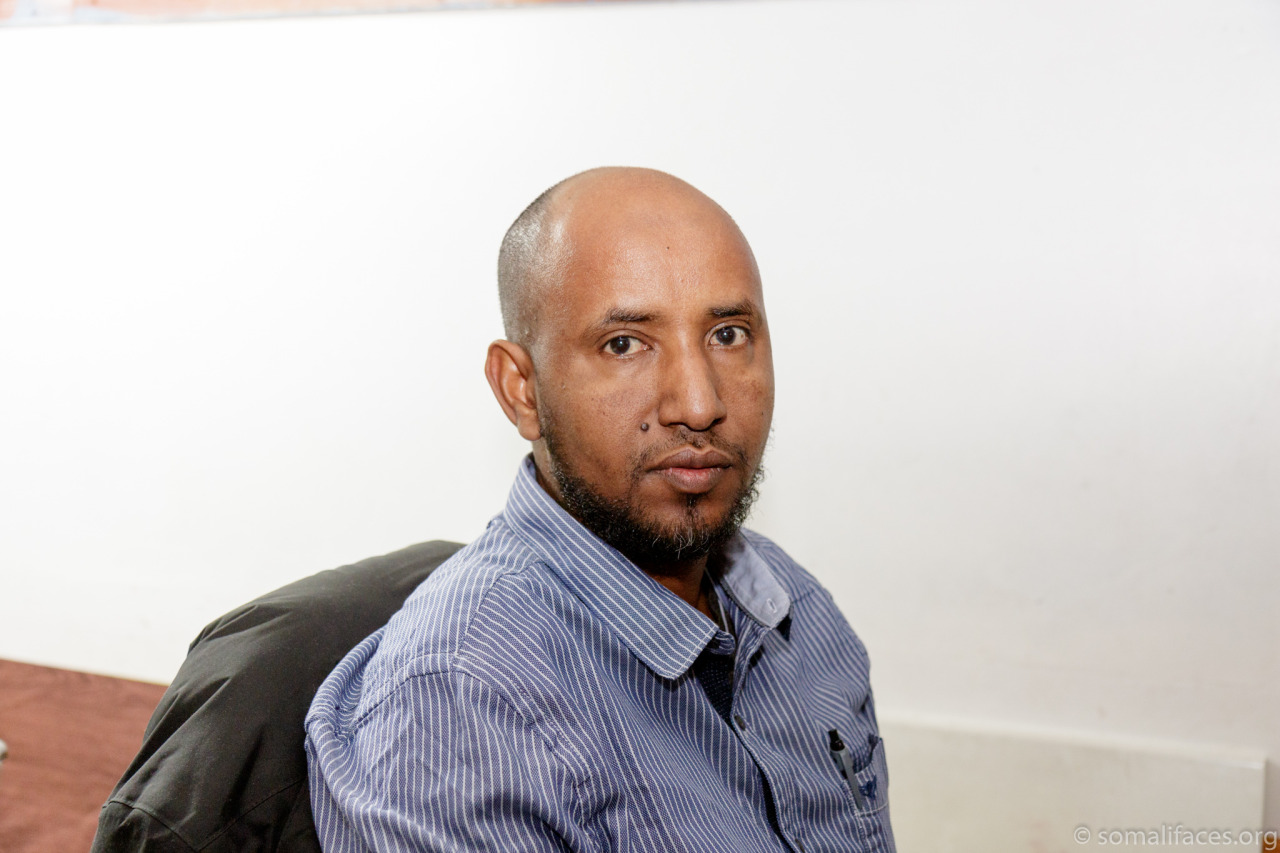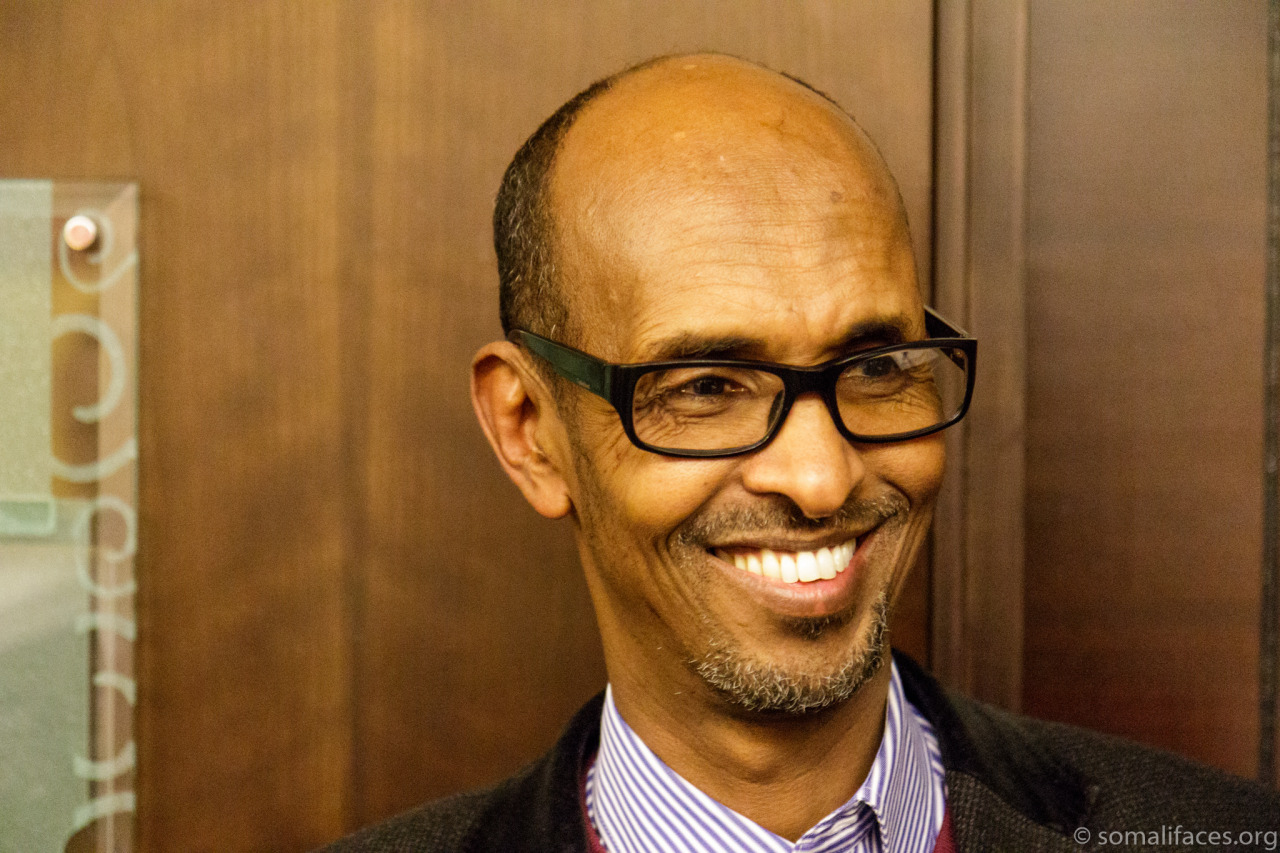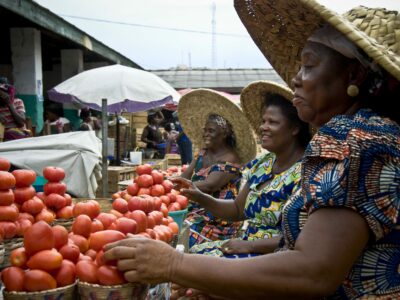وجوه صومالية هو مشروع متاح عبر الإنترنت عمره ٣ أشهر، يشارك قصصًا من الحياة اليومية عن أشخاص صوماليين عاديين من جميع أنحاء العالم. كان المشروع من بنات أفكار الثنائي المبدع دنيا جمال آدم، وهي راوية ومدافعة عن حقوق الإنسان ومديرة حملات، ومحمد إبراهيم شاير، وهو مؤلف ومولع بالتاريخ. وكلاهما من هواة التصوير الفوتوغرافي أيضًا.
للمشروع هدفان رئيسيان: أولهما هدف عالمي، يسعى لتغيير صورة الصوماليين في أذهان العالم ليدرك أنهم شعب مسالم ومرن، وبذلك يتحدى المشروع القوالب النمطية التي تصنفهم كإرهابيين وقراصنة ومقاتلين ولاجئين. أما الهدف الثاني فمحلي، وهو بمثابة تذْكِرة إنسانية للشعب الصومالي حتى يسمو فوق العشائرية عديمة القيمة “وليدرك بجدية أن أخيه من العرق ذاته لديه معاناته الخاصة وأحلامه وأحزانه وطموحاته.”
ويعيش الشعب الصومالي ليروي قصصًا عظيمة؛ قصصًا عن الفقدان والخسارة بالتأكيد، لكنها عن الأمل والرجاء أيضًا. ويقدم مشروع وجوه صومالية تلك القصص عبر زيارة الصوماليين في جميع أنحاء العالم والتفاعل معهم. فجميعهم، بكبيرهم وصغيرهم، لديهم حكاية يحكونها. وهذه بعض أقوى القصص تأثيرًا…
المُعلمة
I was born in Pakistan, raised in the United States and currently live in Hargeisa [Somaliland]. I moved to Hargeisa at the age of 10, after the tragic death of my mother (May God grant her Paradise). I come from two mostly uneducated, nomadic families. […] Being born to these two types of families […] gave me the eagerness to push myself and become successful and educated, be a successful story for my parents. Since my mother passed away, I always get judged strictly on a daily basis by the elders of our Somali community. […] So I arranged my goals into a strict order: news anchor, teacher, wife and a mother. […] I started anchoring news and programs for the English section of Radio Hargeisa at the age of 16. Then to make my father happy, I went on to study Public Health at a local university and found love in teaching. You never know when love knocks on your door. I never thought in a million years of getting married at a young age. Then I met my husband and realised he was the one for me. Alhamdullilah, we have been married for two years and I’m currently 19. We have a beautiful daughter and I’ve fulfilled the order I set out earlier and continue to act on it. My husband taught me to live by the well-known saying, ‘where there is a will, there is a way’. […] I created my own teaching course, teaching fellow Somalis how to learn English as a second language. I try to keep a smile on my face, no matter what I’m going through […] Amidst your rough upbringing, amidst your underprivileged background, the labels that people throw at you, remember you can make things still possible.
وُلدت في باكستان، ونشأت في الولايات المتحدة وأعيش الآن في هرجيسا [عاصمة أرض الصومال]. انتقلت إليها وأنا في العاشرة من عمري، بعد وفاة أمي المأساوية (رزقها الله فسيح جناته). وأنا أنحدر من عائلتين معظم أفرادها من البدو غير متعلمين، […] مما أشعل حماسي لأضغط على نفسي وأصبح ناجحة ومتعلمة، وأن أحقق قصة نجاح يفخر بها والداي.
ومنذ وفاة والدتي وأنا أتعرض للأحكام القاسية من كبار السن في مجتمعنا. […] لذلك وضعت أهدافي في ترتيب صارم: أن أصير مذيعة إخبارية ومُعلمة ثم زوجة وأم. […] فبدأت إذاعة الأخبار والبرامج في القسم الإنجليزي من راديو هرجيسا في عمر السادسة عشر. ثم ذهبت لدراسة الصحة العامة في جامعة محلية، وذلك إرضاءً لوالدي، واكتشفت حينها حبي للتدريس. ومن يعلم متى يطرق الحب بابه. فلم أكن أفكر بالزواج في سن مبكرة على الإطلاق. ثم قابلت زوجي وأدركت أنه الشخص المناسب لي. وها نحن ذا متزوجان منذ عامين، الحمد لله، وأنا الآن في التاسعة عشر من عمري، حيث لدينا ابنة جميلة، وقد حققت أهدافي بالترتيب الذي وضعته لنفسي في السابق وما زلت أتبع خُطاه. علمني زوجي أن أعيش وفقًا للمثل الشائع “الإرادة تصنع المعجزات”. […] فأسست دورة تعليمية خاصة بي، أُدرّس فيها لإخواني الصوماليين كيفية تعلم اللغة الإنجليزية كلغة ثانية. كذلك أحاول أن أحافظ على الابتسامة التي تعلو وجهي مهما كانت الظروف التي أمر بها […] فتذكر أن بإمكانك تحقيق ما تشاء، مهما كانت نشأتك قاسية، وخلفيتك مُعدمة، وبغض الطرف عن التصنيفات التي يصنفك الناس بها.
“الفتاة الكفيفة”

تصوير وجوه صومالية (دنيا ومحمد). استُخدمت الصورة بتصريح.
My family and the Somali people that I interacted [with] didn’t know the proper way to raise or approach a blind girl. As a result, I became self-dependent and quite isolated. During my younger years, we lived in a village called Higlale, close to a large well. On a given morning, I accompanied my mother to collect some water […] my mother saw from afar two figures approaching the well […] You see, I love plants and flowers, though I’ve never seen how they look like, but I love caressing them, gently stroking them. So whilst we waited for them, I plucked lots of flowers, as many as my two hands could hold. When the two figures approached the well, they turned out to be a distant relative and her son. After greetings were exchanged, my aunt said […] ‘Who is this beautiful girl sitting next to you, is she yours?’ Before my mother could reply, she answered her own question: ‘Is she the blind girl?’ My mother replied in the affirmative. I got used to being referred to as the blind girl and I guess over the years, the hurt feeling dampened so it didn’t bother me much. But suddenly, once he heard that I’m blind, the son started walking towards me and sat next to me. He took the flowers that I held in my hands and patiently told me their names, their colours, where they can be found. I was taken aback for no one has ever done that for me. […]
He promised me that he will take me as many places as he possibly can, full of flowers and greenery. From that day onwards, he took me to the most beautiful places and we spent a lot of time together. I fell in love with him but since I was a young girl, I could not tell him. I kept thinking, in time I will disclose it to him. Unfortunately, we had to move […] In 2009, we saw [each other] once again in Hargeisa and I told myself that I’ve been given another chance to tell him so I did […] he replied with a question that bothered me to the core. He said: ‘How is possible for you to love, considering that you are blind and can’t see me?’ […] I tried to remain calm and explain to him that we, blind people, are capable of recognising love. In fact, you don’t need physical eyes to see and experience love. Love is experienced through the intuitive knowledge of our hearts and I see and recognise it with the eyes of my heart. […] In the end, however, we didn’t end up together and that’s God’s will. But know that beauty and love’s not experienced through your physical eyes. It’s experienced through your heart and I tell others who have been in my situation and are blind, if you experience love, don’t let your disability deter you from pursuing it. Everyone is capable of love.
لم تكن عائلتي ومن حولي من الصوماليين الذين يتعاملون معي يعلمون الطريقة الملائمة لتربية فتاة كفيفة أو التقرب منها. ومن ثم صرت معتمدة على نفسي ومعزولة عن الآخرين إلى حدٍّ ما. وعندما كنت أصغر سنًا عشنا في قرية تُدعى هيجلالي، كان بالقرب منها بئرٌ كبيرة. وفي صباح يوم ما، رافقت أمي لإحضار بعض الماء […] فرأت شخصين من بعيد يقتربان من البئر. […] وقد كنت أحب النباتات والأزهار، على الرغم من أني لم أراها أبدًا، لكني أحب لمسها وضمها برفق. فقطفت أكبر عدد من الأزهار يمكن ليديّ حملها ونحن في انتظار الشخصين القادمين. وعندما اقتربا من البئر، اتضح أنهما قريبة لنا من بعيد وابنها. بعد تبادل التحية، قالت الخالة […] “من الفتاة الجميلة الجالسة بجوارك، هل هي ابنتك؟” وقبل أن تجيب أمي، جاوبت الخالة سؤالها بنفسها: “هل هي الفتاة الكفيفة؟” فردت أمي بالإيجاب. وكنت قد اعتدت الإشارة لي بالفتاة الكفيفة، وأظن أنها لم تعد تضايقني وتؤذي مشاعري كثيرًا بمرور السنوات كما كان يحدث سابقًا. لكن فجأة، بدأ الابن، بمجرد أن سمع أني كفيفة، يمشي نحوي وجلس بجواري. ثم أخذ الأزهار التي كنت أحملها في يديّ وأخبرني بتروٍّ أسماءها […] وألوانها وأين يمكن إيجادها. أما أنا فذُهلت مما فعل، حيث لم يصنع لي أي شخص شيئًا كهذا من قبل. […]
وعدني أنه سيأخذني إلى أكبر عدد ممكن من الأماكن المليئة بالأزهار والخضرة. ومنذ ذلك اليوم، اصطحبني إلى أجمل الأماكن وقضينا الكثير من الوقت معًا. فوقعت في حبه، لكن لم أتمكن من إخباره بذلك لأني كنت فتاة صغيرة. وبقيت أفكر بأني سأفصح له عن مكنونات صدري في الوقت المناسب. لكننا اضطررنا إلى الانتقال مع الأسف […] وفي عام 2009، رأينا [بعضنا البعض] مرة أخرة في هرجيسا وقلت لنفسي أني قد مُنحت فرصة أخرى لأصرح له عن حبي، وهكذا فعلت. فأجابني بسؤال ضايقني كثيرًا، […] قائلًا: “كيف يمكن لكِ أن تحبي، نظرًا لأنك كفيفة ولا تستطيعين رؤيتي؟” حاولت أن أظل هادئة وأن أوضح له أننا نحن الأكِفَّاء قادرون على تمييز الحب. بل في الواقع لا يحتاج الإنسان عينيه ليرى الحب ويختبره. فقلوبنا تعلم بحدسها أنها تحب […]، وأنا أرى الحب وأميزه بعينيّ قلبي. […] ولم ينتهي بنا المطاف معًا، وتلك مشيئة الله. لكن لتعلموا أنكم لا تختبرون الجمال والحب بأعينكم، بل بقلوبكم. وأنا أقول لغيري من الأكِفَّاء الذين مرّوا بموقفي ذاته: إذا اختبرت الحب، لا تدع إعاقتك تمنعك من السعي وراءه. فجميعنا قادرون على أن نحب.
المهاجر

تصوير وجوه صومالية (دنيا ومحمد). استُخدمت الصورة بتصريح.
Whilst in Mogadishu, a close friend of mine and I decided to enter Europe and travel through the usual path, which is from Ethiopia, Sudan, Libya and then into Europe. We ran out of money and were stranded in Ethiopia. […] I was broke, couldn’t speak Amharic and had little rent money left. With my last remaining money, I bought a Somali-English dictionary and grammar book. Every day, I would study at least 20 English words […] Within 2 months, I reached to a decent level where I could understand news programmes in English. I was getting stressed as the little money that I had left was running out but opportunity knocked […] You see, there was this Somali IT teacher who wanted to learn Arabic and I spoke fluent Arabic. […] He said he was willing to give 400 Ethiopian birr [Ethiopian currency] which was a lot […] my monthly rent was 50 birr. I thought about it and told him that I didn’t want his money. Just teach me computing and I will teach you Arabic. He happily agreed but told me that he couldn’t give me a certificate as I didn’t have a refugee card. I didn’t mind but of course, I was still not getting any money in. But thank God, by the next day, I met an American who wanted to learn Somali and we agreed that he would pay me 50 Ethiopian birr per half hour. After I taught him the Somali language, he tested it by travelling to the Ethiopian Somali region. A week later, he came back and started praising me profusely. Given that I had computing skills and spoke decent English, he offered me a good job at his place. […] Money comes and goes but knowledge lasts forever.
قررت أنا وصديق مقرب لي، بينما كنا في مقديشو، أن ندخل أوروبا وأن نسافر عبر الطريق المعتاد، أي من إثيوبيا إلى السودان وليبيا ثم أوروبا. لكن نفد مالنا وعلقنا في إثيوبيا. […] كنت مفلسًا، ولم أستطع تحدث اللغة الأمهرية ولم يبقَ معي إلا القليل من المال لإستأجار مسكن. فاشتريت قاموسًا صوماليًّا-إنجليزيَّا وكتاب نحو بآخر نقود أملكها. وكنت أدرس ما لا يقل عن 20 كلمة إنجليزية كل يوم. […] وفي غضون شهرين، كنت قد بلغت مستوًى جيدًا مكنني من فهم البرامج الإخبارية بالإنجليزية. لكني بدأت أشعر بالتوتر لأن ما تبقى معي من مال قليل كان ينفد، إلى أن طرقت إحدى الفرص بابي. […] فقد كان هناك مدرس تكنولوجيا معلومات صومالي يريد أن يتعلم اللغة العربية، وكنت أنا أتحدث العربية بطلاقة. […] وقد قال أنه مستعد لدفع 400 بير إثيوبي [العملة الإثيوبية]، وهو مبلغ كبير، […] حيث كان مبلغ إيجار سكني 50 بير شهريًّا. لكني فكرت في الأمر وأخبرته أني لا أريد ماله، أريده فقط أن يعلمني مهارات استخدام الحاسوب وسأعلمه العربية. فوافق بكل سرورٍ لكنه أخبرني أنه لن يتمكن من منحي شهادة لأني لم أملك بطاقة لجوء. ولم أمانع بدوري، لكني بالطبع لم أكن سأجني أي مال. إلا أني والحمد لله قابلت بحلول اليوم التالي أمريكيًّا يرغب في تعلم اللغة الصومالية واتفقنا أن يدفع لي 50 بير إثيوبي لنصف الساعة. وبعد أن علمته الصومالية، اختبر نفسه بالسفر إلى المنطقة الإثيوبية الصومالية. وعاد الأمريكي بعد ذلك بأسبوع، وبدأ يمدحني بشدة. ونظرًا لما لديّ من مهارات باستخدام الحاسوب ولأني أتحدث الإنجليزية جيدًا، عرض عليّ وظيفة جيدة في مؤسسته.[…] إن المال يأتي ويذهب، لكن تبقى المعرفة إلى الأبد.
الخبير العسكري

تصوير وجوه صومالية (دنيا ومحمد). استُخدمت الصورة بتصريح.
I used to be part of Somalia’s elite special operations force before the civil war. We were Somali taught and thus trained/conducted exercises with the US Army Rangers and Egyptian Special Forces. We used to rotate; sometimes we trained in Somalia, sometimes in Egypt, other times in the United States. After 1991, I switched to IT and left my knowledge and experience in Somali military behind. It was only in 2006 when I saw what foreign forces were doing in Somalia that I changed course, how we do not have any military science specialists and that we have to be trained by so many different countries instead of empowering Somali trainers. I left the world of IT and decided to study military science from scratch, the theoretical aspect for I already am experienced in the practical aspect. I am now currently doing my PhD in Political/Military Science in order to fill the vacuum instead of keeping it open for non-Somalis. I’m aiming to bring back Somali military science, by Somalis and for Somalis.
كنت ضمن نخبة قوة العمليات الخاصة الصومالية قبل الحرب الأهلية. ولأننا تعلمنا تعليمًا صوماليًّا، أجرينا تدريبات مع جوالة الجيش الأمريكي والقوات الخاصة المصرية. واعتدنا على تبديل المواقع، فتدربنا في الصومال أحيانًا، وفي مصر أحيانًا، وفي الولايات المتحدة أحيانًا أخرى. وبعد عام 1991، تركت معرفتي وخبرتي في الشؤون العسكرية الصومالية ورائي، وغيّرت مجالي إلى تكنولوجيا المعلومات. إلى أن حلّ عام 2006 حيث غيّرت مساري، وذلك بعد أن رأيت ما كانت تفعله القوات الأجنبية في الصومال، وكيف لم يكن لدينا أي متخصصين في العلوم العسكرية، وكيف أننا مضطرون للاستعانة بالكثير من الدول المختلفة لتدربنا بدلًا من تمكين مدربين صوماليين. فتركت عالم تكنولوجيا المعلومات ورائي، وقررت دراسة العلوم العسكرية من الصفر، وبالأخص الجانب النظري حيث أني خبير في الجانب العملي بالفعل. وأنا حاليًا أدرس الدكتوراه في العلوم السياسية العسكرية من أجل سد الثغر، بدلًا من ترك المجال مفتوح لغير الصوماليين. فهدفي هو إحياء العلوم العسكرية الصومالية، بأيدي الصوماليين ومن أجلهم.
الناشطة

تصوير وجوه صومالية (دنيا ومحمد). استُخدمت الصورة بتصريح.
I was six years old. I went out to play with my friends […] Given that we didn’t have much to play with, we scanned the place for objects that we could play with. […] I found this particular metal object that was beautifully shaped and presented it to my friends […] But it kept getting hot so I chucked it away by throwing it in the air and giving it a nice kick. The minute I kicked it, it blew up. I became unconscious. I opened my eyes at the hospital. I tried to get up but was told that I lost both of my legs. I lost hopes and saw my ambitions dwindling away. I gave up on life. You will never walk again, I told myself. […] After several months in the hospital, the UN visited me and were intrigued by my case so they offered me artificial limbs in order for me to walk again. I […] was suddenly overwhelmed with a new sense of hope. I was the first Somali to have artificial legs fitted. In 1996, I attended an international conference on mine elimination in Switzerland. They kept asking me, what can we do for you, do you want to stay in Switzerland or any other country? I told them to build me a school in my birth city, and they did. It was aptly named after me. I attended my own school and finished high school there. I now have a bachelor degree and campaign for a local organisation that raises awareness for disabled Somali people. You might be physically disabled but that doesn’t mean you’re mentally disabled. If you have an ambition, there are many ways to achieve it.
كنت في السادسة من عمري. خرجت لألعب مع أصدقائي […]. ولأننا لم نملك الكثير من الألعاب، فتشنا المكان بحثًا عن أغراض يمكننا اللعب بها. […] ثم عثرت على هذا الغرض المعدني جميل الشكل وقدمته لهم. […] لكن ظلت حرارته تزداد، فتخلصت منه بقذفه في الهواء وركله ركلة جيدة. وبمجرد أن ركلته، انفجر. فقدت وعيي، ولم أفتح عينيّ إلا في المستشفى. حاولت أن أنهض لكنهم أخبروني أني فقدت ساقيّ. ففقدت معهما الأمل ورأيت طموحاتي تتداعى أمام ناظري. كذلك يأست من حياتي، وقلت لنفسي أني لن أمشي مجددًا. […] بعد انقضاء عدة أشهر على بقائي في المستشفى، زارني أفرادٌ من الأمم المتحدة وأثارت حالتي اهتمامهم، فعرضوا عليّ أطرافًا صناعية لأتمكن من المشي مجددًا. وفجأة […] غمرني شعورٌ جديد بالأمل. وقد كنت أول شخص صومالي يحصل على أرجل صناعية. وفي عام 1996 حضرت مؤتمرًا دوليًّا في سويسرا عن إزالة الألغام. وظلوا يسألوني عما يمكنهم فعله من أجلي، وإذا كنت أرغب في البقاء في سويسرا أو أي دولة أخرى؟ فأخبرتهم أن يبنوا لي مدرسة في المدينة التي وُلدت بها، وهكذا فعلوا. وسموها على اسمي بالطبع. فذهبت إلى مدرستي وأنهيت فيها المرحلة الثانوية. والآن أحمل شهادة جامعية، وأنظم حملات لصالح منظمة محلية تنشر الوعي من أجل الصوماليين ذوي الإعاقات. كونك صاحب إعاقة بدنية، لا يعني أنك تعاني من إعاقة ذهنية. وإذا كنت تطمح إلى أمرٍ ما، هناك طرق كثيرة تمكنك من تحقيقه.
يمكنك قراءة المزيد من القصص المُلهمة على موقع وجوه صومالية، ومتابعة المشروع على تويتر وفيسبوك وإنستجرام.








2 تعليقات
كل المقالات التي قراتها علي الصوماليين اعجبتني وشكرا لكم من اعماق قلبي وتحياتي من نيو ورك
شكرًا لك دائمًا…